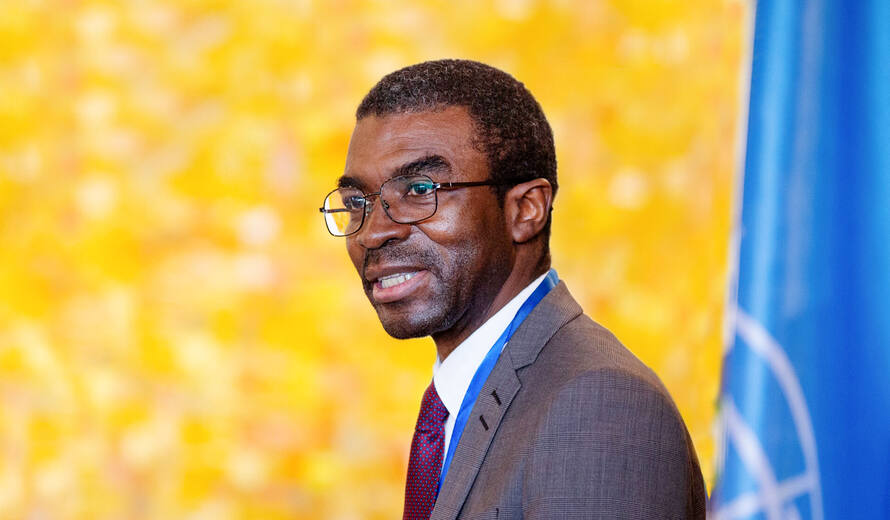| Audrey Azoulay names Lazare Eloundou Assomo head of the WHC |
| PublishDate:2021-12-09 Hits:7502 |
Lazare Eloundou Assomo
01 About the World Heritage Centre Created in 1992, the Centre coordinates all actions related to World Heritage within UNESCO. It is responsible for the day-to-day management of the Convention (adopted in 1972, 50 years next year), for organizing the annual sessions of the World Heritage Committee and its Bureau, and it advises States Parties on the preparation of their nominations. The Centre coordinates the process of reporting on the state of conservation of sites and urgent actions required when a site is under threat. It also organizes international assistance from the World Heritage Fund upon request. Finally, the World Heritage Centre is in charge of public information about World Heritage and, in this capacity, develops educational material to raise awareness of heritage protection among young people.
02 New Director of the World Heritage Centre
Due to the retirement of Ms Mechtild Rössler from her post as Director of the Centre on 30 September 2021, UNESCO Director-General Audrey Azoulay launched a call for candidates (internal and external) to replace her. At the end of the process, she selected Lazare Eloundou Assomo. A Cameroonian with 26 years of professional experience, including 21 years working on World Heritage, Lazare Eloundou Assomo is a man of the field and an advocate for the protection of heritage with governments. He will take up his post as Director of the World Heritage Centre at the start of January 2022.
It should be noted that this will be the first time in the history of the World Heritage Centre that it will be directed by an African national. This is a strong symbol.
03 More about the new Director’s professional background
A graduate in architecture (Grenoble School of Architecture, France) and in urban planning (DEA Grenoble 1), Mr Eloundou Assomo began his career as an associate researcher at the Centre for Earthen Construction of the Grenoble School of Architecture in 1996. He was then in charge of implementing habitat projects in Africa, and then of the pedagogical coordination of the Africa 2009 conservation programme set up by UNESCO’s World Heritage Centre and ICCROM.
He joined UNESCO in 2003 in the Africa Unit of the World Heritage Centre, where he contributed to the creation of the African World Heritage Fund and the development of the World Heritage Earthen Architecture Programme (WHEAP).
From 2008 to 2013, he was Head of the Africa Unit of World Heritage Centre. During this period he coordinated several restoration projects in Mozambique (Ilha World Heritage site Fortress), Uganda and Mali, as well as capacity building initiatives in the region. He is the author of the book African World Heritage: A Remarkable Diversity, co-authored with Ishanlosen Odiaua and published in 2012 by UNESCO.
In 2013, he joined the UNESCO office in Bamako and became its head in 2014. He then became UNESCO’s head representative in Mali. While the country was hit by a violent armed conflict, he was in charge of the protection of Mali’s cultural heritage. He successfully led the reconstruction of the Timbuktu mausoleums and the safeguarding of ancient manuscripts.
He returned to UNESCO Headquarters in Paris in 2016, initially as Deputy Director of the Heritage Division and of the World Heritage Centre. In 2018, he became Director of Culture and Emergencies, coordinating emergency conservation responses to heritage affected by conflicts and disasters and the restitution of cultural property under the 1970 Convention.
''The 50th anniversary of the World Heritage Convention, which will be celebrated in November 2022, will be an opportunity for a great retrospective but also for a collective reflection on the best ways to make our approach prosper over the coming 50 years. In particular, we have two challenges to meet: on the one hand, to make the World Heritage List ever more representative of the world’s cultural and geographical diversity; on the other hand, to strengthen the protection of listed sites inscribed in the face of the new challenges of our age, linked to development, conflict and climate change.''
——Lazare Eloundou Assomo, new Director of the World Heritage Centre of UNESCO
News source:UNESCO |
- New Year Message | UNESCO World Heritage Centre for Training and Research in the Asia and Pacific Region (Shanghai) Extends to You Its Sincere New Year Wishes!
- Review | Cooperation between Xiamen, CNR and WHITR-AP Shanghai
- Review | Yunlong International Workshop on Vernacular Heritage
- Review | The Heritage Educational Landscape Exhibition
- Review | UHC-HEI 1st General Assembly
- Summary |2025 "Prosperity & Livelihoods" Good Practices recognized in Liangzhu, China—Jointly Mapping a path for integrating heritage and sustainable development
Copyright © 2009-2012 World Heritage Institute of Training and Research-Asia and Pacific (shanghai)



